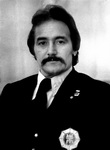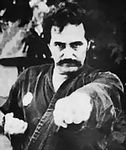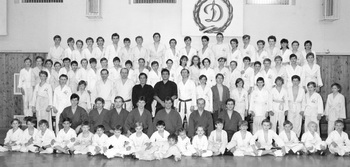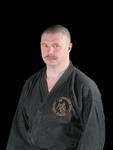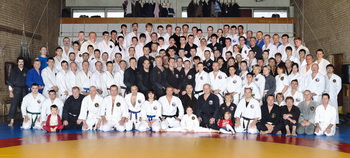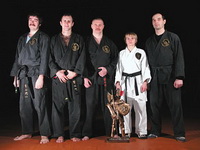Tin Woodman School majors in operational karate, a rare version of martial arts which came into being as a result of efforts on the part of Cuban power combat masters, and primarily, those of Mr.Raul Riso, currently the Senior Karate Instructor, the Cuban National Karate Federation. For his part, Mr.Riso took a course of classical karate in Japan in the late 60s. However, he did not confine himself to the basic knowledge obtained from his Japanese teachers, but went on to create an applied combat style having made it multi-purpose and thus adoptable for use by a wide range of service units, military and law enforcement alike. From among a large range of the technical elements available, included in the style only were those that had been proven effective under the real combat situations the Master passed through at several hot spots. All the rest of them were left out; consequently, one can only rely on just a bare minimum of moves allowing one to get the upper hand at a face-to-face fighting by means of hitting most vulnerable points onthe enemy’s body, an essential necessity coupled with it being the possession of high morale enabling one to suppress the enemy’s ability to fight back.
Operational karate has been widely used in Cuba for over 40 years now and to a certain extent contributed to contain the USA in its uneasy relations with Havana.
With the passage of time, operational karate has spread beyond the Cuban borders. A number of other countries, with this one included, have highly appreciated the universal character of the style together with lots of technical means it offers and a vast potential of applicability in all sorts of situations resulting from the dynamics of combat circumstances. The Soviet COMMITTEE FOR STATE SECURITY (KGB) back in 1976 decided to make operational karate an essential part in the physical training of its officers who once took classes given by Mr.Riso in person along the lines of methods and tactics of the style.
Featuring among the first group of instructors which met the operational karate qualifications were Mr.Valery Samoilov and Mr.Anatoly Prudov. Down the road, within the time spell from 1979 to 1990, these two – together with other karate experts – made their best to modify the style: while having retained the main concept and nature of operational karate, they slightly customized it in keeping with their own perception based on their own experience. An immense role in furthering this country’s operational karate was played by the following people: Valery Samoilov, Anatoly Prudov, Sergei Stelmakh, Gennady Dementiev, Vladimir Diomin, Alexander Beinarovich, Alexander Alexeev, Alexander Zudin, Sergei Gomon, Valery Panfilov, Vassily Pochenchuk, Anatoly Smirnov, Sergei Scherbakov and Boris Shirobokov.
It is worth mentioning that, Raul Riso was again invited to the USSR in 1989 to attend a retreat involving operational karate instructors, with the purpose of certifying the best ones of them which were employed by the respective department of KGB and those who served as body guards of the then Federal President Mikhail Gorbachev.
The retreat was a success, its main outcome being an official registering of the fact that operational karate, as a martial art, had gained a further headway, while many of the retreat participants made a large progress in mastering the style, subsequently being promoted to the rank of operational karate experts. Among them were truly ardent followers of the style, who set themselves a task of disseminating operational karate all over the country. Before all, one should again mention here the names of Valery Samoilov, Anatoly Prudov, Sergei Stelmakh, Gennady Dementiev, Alexander Alexeev, Alexander Zudin, Vassily Pochenchuk, Anatoly Smirnov, Sergei Scherbakov and Boris Shirobokov. Their efforts resulted in the working out of training programmes which triggered the formation, within the structure of ARSENAL Sporting Club, of first operational karate groups for children and teenagers ranging from 7 to 18 years old and divided into respective age groups.
Not the last in the line-up of the cited earlier operational karate instructors is Gennady Dementiev, the founder and Executive Manager of the TIN WOODMAN School. It was as early as in his teens that he ventured on the road to become a professional martial arts fighter. Such character traits of his as persistency and steadfastness coupled with inborn maximalism do account for the fact that by the mid 80s he already was a leading instructor to conduct training classes of specialized physical fitness and hand-to-hand combat to military and law enforcement officers. Personally, Mr. Dementiev participated in numerous competitions held under the auspices of the Dynamo Sporting Society and distinguished himself as a die-hard fighter possessing an excessively tough and furious combat style allowing him to gain victory in the shortest time possible. That is the reason why Gennady’s colleagues gave him the nickname of Tin Woodman, thus identifying him with a main character of the tale The Sorcerer of the Emerald Town. It should be remembered that Tin Woodman possessed a combination of qualities which rarely go together - iron muscles along with iron will and tenacity, bravery and persistence, impudence and audacity, truthfulness and tenderness.
Quite naturally, the Dementiev brainchild – Tin Woodman Operational Karate School – officially established in 1989 - bears his nickname. Todate, the school brings together under its emblem around 500 pupils attending different groups formed up on an age/professional basis in several Moscow locations and city outskirts. Training sessions are conducted by a group of the school instructors.
Making up the group are: senior instructors Alena Dementieva, Alexander Moroz and Sergei Kolosov; junior instructors Alexei Ageev and Elena Nechaeva, assistant instructors Alexei Petrik and Viktor Shatalov. All sorts of medical matters are attended to by the school physician Mr.Yury Trushin. To become a school instructor one has to meet the following qualifications: a) to have a higher school certificate in sports, and b) to constantly uphold the professional qualities. Maintaining the latter is highly dependable on hard work and regular attendance of both specialized training sessions and sporting workshops.
Evidently, the school history is relatively short, however, it is rich in all kinds of important sporting achievements. To name just a few of them: the devising of educational and training methodologies, and the attaining of needy teaching experience, and the forming of a body of followers from among the attendants, and the bringing up of a number of outstanding athletes; to say nothing about the atmosphere of growing meeting of minds and all-round assistance reining at the School.
Needless to say, the current good situation the School finds itself in is a result of the meticulous work and day-to-day care on the part of the School General Manager Gennady Dementiev, a remarkable person in many ways, whose activities were marked by Federal President’s decree, dated October 12, 2006, awarding him the title of The Honorary Worker of Physical Culture of the Russian Federation.
